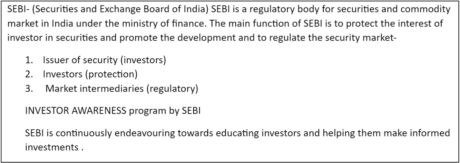CONTEXT- National Stock Exchange (NSE) issued a string of notices naming entitles involved in ‘Dabba Trading’.
What is Dabba Trading?
– Dabba Trading is an illegal form of trading in shares where the operator of such trading allows people to trade in equities outside the purview of the stock exchanges.
– It involves parallel stock markets where traders can speculate on the direction of share prices and stock indices without trading account, demat account or providing any kind of KYC details.
– Dabba trading could be placing bets on currency, current market indices and commodities. In simple words, it is gambling centre around the stock price movement.
– The transaction is settled in cash and order taken by persons.
– Dabba trading is also known as Box trading in India and Bucket trading in USA.
Affect our economy-
– No income tax levied on profits.
– Traders need not to pay Commodity Transaction Tax (CTT) or Securities Transactions Tax (STT) which tends to loss to exchequer.
– Trading system is pseudo market and without any settlement guarantee and lose all investment.
– Investors are without formal provision for investor protection. No dispute and grievance Redressal mechanism are available to investors.
– Brokers default in paying to investors becomes insolvent and bankruptcy.
– Investors are investing at their own risk which tends vulnerable investment option.
– Profit from the Dabba Trade depends on lose of another client.
– There is no provision for KYC which can lead to the flow of money to drug trafficking and funding organization of terrorist activity.
– Dabba trading is the method of converting black money into white.
Law provision-
– Dabba trading is recognized as an offense under section 23(1) of the Securities Contracts (Regulation) Act (SCRA), 1956 and upon conviction, can invite imprisonment for a term extending up
to 10 years or a fine up to 25 crores, or both.
– It is prohibited activity under regulation 3 and 4 SEBI- prohibition of fraudulent, unfair trade practice relating to Securities Market Regulation,2003
– It is also punishable under IPC (Indian penal code) and IT Act 2000.

For Best Online Courses for UPSC, Visit: www.ensembleias.com





